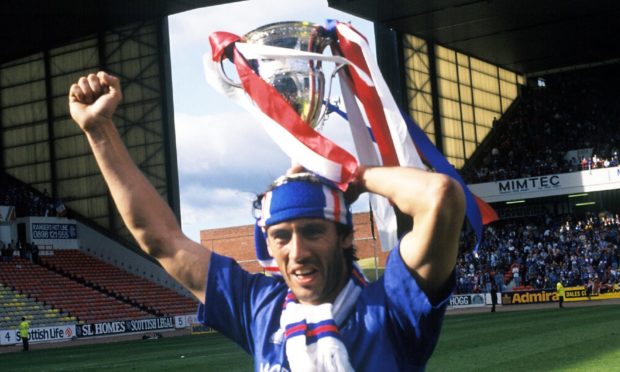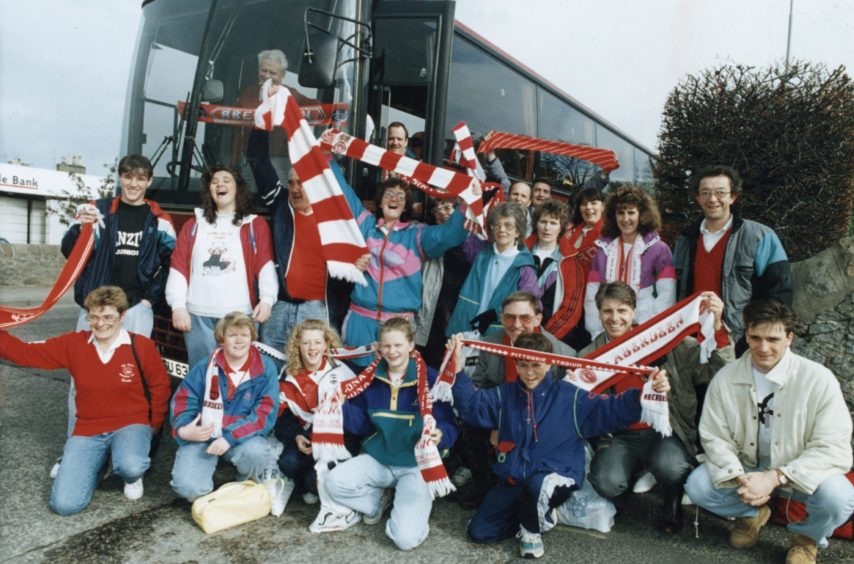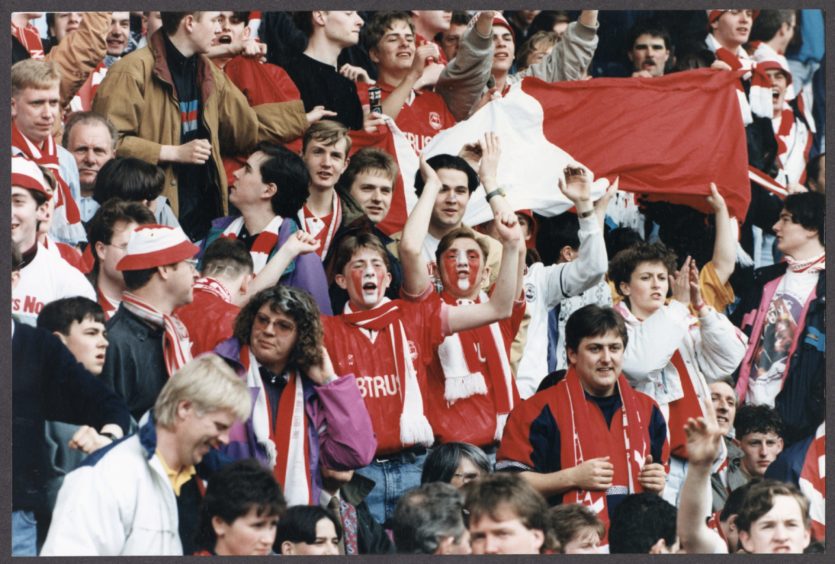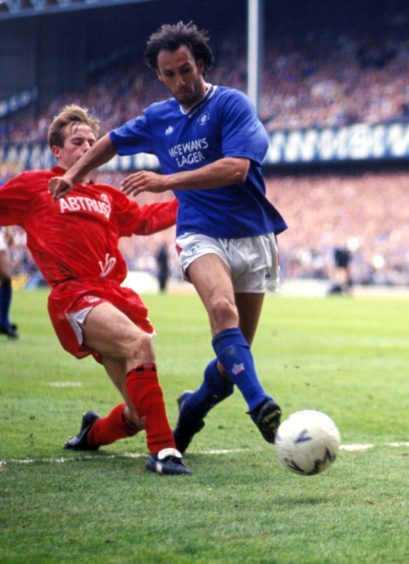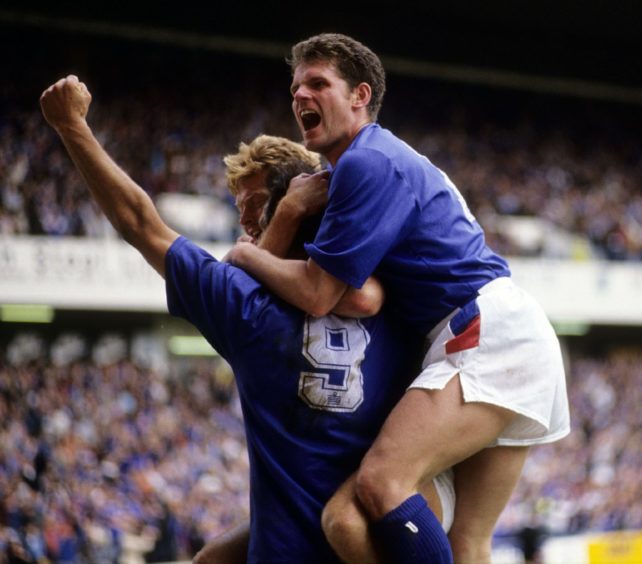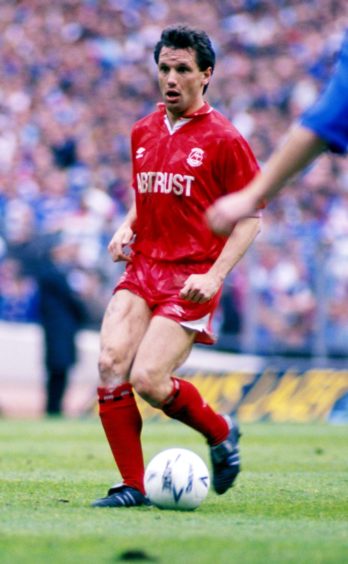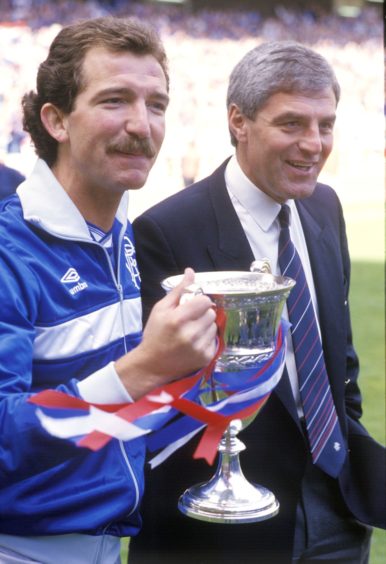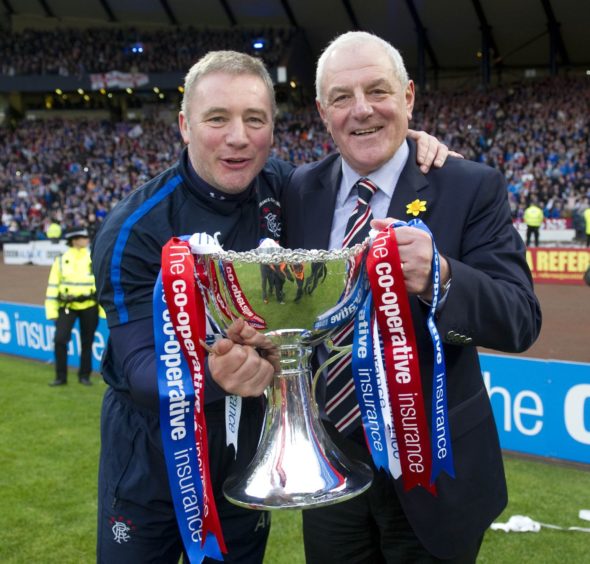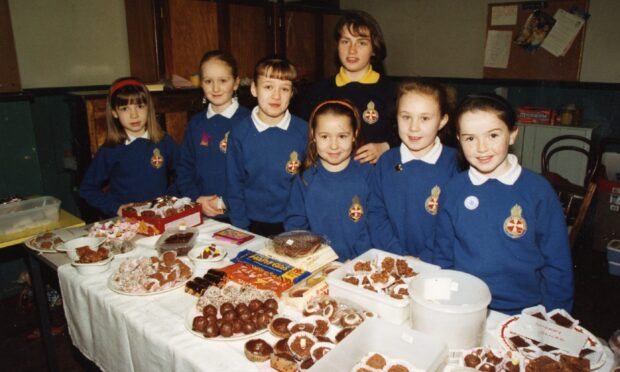Few seasons in Scottish football history have encompassed so much drama, controversy and intrigue as the 1990-91 campaign, which ebbed and flowed and fluctuated all the way down to the final day.
Aberdeen, who had struggled to regain the momentum which they had developed under Alex Ferguson, appointed Alex Smith in 1988 and this redoubtable little coiled spring of energy and effervescence began working wonders in the quest to pursue fresh honours for the Pittodrie club.
Rangers, meanwhile, were intent on gathering their fourth Scottish championship title in five years, but were rocked in the last few weeks of the season when Graeme Souness left Ibrox in April 1991 and tried to persuade his assistant, Walter Smith, to join him at Anfield, even as the Dons edged ahead of them in a frantic denouement to the race.
In the end, Smith stayed in Glasgow and wrestled some of the initiative back from the challengers, but it all boiled down to a climactic contest in Govan and a straightforward equation: a draw would do for the visitors and they could travel back to the north-east with another honour in the bag.
Sadly, from their perspective, the script veered in a different direction.
The pre-match pep talk from the fans
Jock Gardiner, who now works with the Aberdeen FC Heritage Trust, was among the 3,000 fans who journeyed down the A90 to Perth and thence on to Glasgow with hope in his heart for that Saturday shoot-out.
He recalled: “I had enjoyed myself attending an AFC Supporters night out in Mintlaw the previous week and [goalkeeper] Michael Watt was one of the two Dons players who was there at the function.
“I vividly remember telling him to stand up and be brave the following week at Ibrox. The other memory along the way that sticks in the mind was Jim Bett’s late winner for the Dons at the old Love Street in the run-in to the title decider – that was the moment I truly believed we could win the league.”
The joy on their faces as they boarded the buses testified to the optimism among the Dandies on that Saturday in May. But all their expectations were to be dashed on an afternoon which reflected the vitriol and venom – described by Gardiner as the “most hostile atmosphere I had ever encountered at a match” – which had gradually built up between these implacable opponents.
Walter Smith was left to patch up his team
The newly-appointed Walter Smith thrived in testing circumstances when a combination of managerial turmoil and a weakened squad allowed Aberdeen to dream about breaking the Old Firm’s recent stranglehold.
His first game in charge was against St Mirren in Paisley and, despite an error-strewn performance, Sandy Robertson’s goal proved enough.
Dundee United were subsequently defeated at Ibrox, but even as that success was being celebrated, Richard Gough was stricken with hepatitis and the extent of the injury and illness at the club was on such a scale that Smith admitted: “For a couple of days, we were struggling to put a team together.”
Aberdeen, meanwhile, stretched their 12-match unbeaten sequence with a victory over St Johnstone, which installed them at the top of the table, and ensured that a draw would suffice when they came calling at Ibrox.
Opportunity Knox for the new Rangers boss
This was the closest finish to any campaign since the dramatic events of 1986 when Celtic snatched the spoils from under Hearts’ noses.
Even as Walter Smith plotted and planned his strategy, he recruited an assistant from Manchester United, the familiar figure of Archie Knox, in a coup which created a temporary chill in relations with Alex Ferguson, who was less than impressed at losing his confrere while preparing for the European Cup Winners’ Cup final against Barcelona in Rotterdam.
Smith was as surprised as anybody that Knox took the bait, after he had unsuccessfully sounded out the late Ray Wilkins, but these two characters were hewn from granite, never wasted breath on flowery language when X-rated tirades would do the trick, and worked instinctively from the outset.
The stage was set for a confrontation which would test their mettle and the stakes were obvious. As Smith said: “I knew that, while it was very much Graeme’s squad, that if we lost to Aberdeen, it would have been viewed as the first trophy I had lost as Rangers manager.”
Hateley was the hero or villain of the contest
There was a massive cheer around Ibrox when the hosts ran out to be embraced by their fervent support. This was no occasion for faint hearts, but Mark Hateley emerged as the pivotal figure, even if his various contributions were not appreciated by the vastly out-numbered visiting fans.
Brian Irvine, who had excelled in the Dons defence for most of the season, was injured and had to watch from the sidelines, but was still confident.
He recalled: “It was very tense and nervous the night before. But in Alex McLeish, Stewart McKimmie and Theo Snelders, we had excellent players, and Hans Gillhaus was also a real top-class player, while Peter van de Ven, Brian Grant and Robert Connor were all great midfield players.”
The Dons were certainly not overawed, and Gillhaus and Van de Ven both carved out good chances, but they couldn’t make the breakthrough.
And spectators such as Gardiner were outraged when Hateley launched into an uncompromising challenge on Michael Watt which flattened the latter. He escaped any punishment even as the goalie lay crumpled on the ground.
Cometh the hour, cometh the Mark
Hateley didn’t desist from delivering a typically whole-hearted and industrious display when it was required. And he was instrumental in gradually, inexorably, squeezing the life out of his rivals.
The decisive moments came on either side of the interval and they reflected the striker’s different qualities. First, the Englishman delivered a towering header from Mark Walters’ cross to bullet the ball into the net, then he converted from close range after Watt had spilled a Maurice Johnston cross.
These were hammer blows to Aberdeen and, although they never stopped powering forward, there was a sense of inevitability as the contest advanced.
By the climax, the stadium resembled one of those old revivalist meetings in the Deep South of the USA. And, despite the grievances felt by Aberdeen over the early infringement on Watt, Smith and Knox were jubilant when the final whistle sounded and they could soak in the heady taste of triumph.
Smith knew the score with his squad
Nonetheless, after the party festivities were finished, Smith made it clear that the credit for Rangers’ success should really go elsewhere.
This was a transitional, often seismic period in Scottish football. Celtic were in such a poor state that their supporters’ humour tended to be of the gallows variety. As for Aberdeen, who had provided such a stubborn and sustained challenge on a fraction of the Ibrox budget, they would not provide such a potent threat again for many years.
In Edinburgh, Hearts and Hibs were at each other’s throats over Wallace Mercer’s controversial proposal to create just one capital side, which would have had the impact of consigning the Easter Road club to oblivion.
Given which circumstances, Rangers had the scope for expansion under Smith which had never quite materialised during the Souness era.
Yet there was one final communique between these Ibrox associates.
As Smith revealed: “The dust had barely settled on the Aberdeen victory when Graeme phoned me in the manager’s office after the game to congraulate me and the players on the outcome.
“When I told him the team that had finished the match that afternoon, he wouldn’t believe me, because we had so many people operating out of position and yet we still held on for the title.
“It gave me the basis for the changes which I knew I had to make the following season, but it also proved to me that there was a vibrancy and a resilience about this particular Rangers squad which would see them through thick and thin.”
In the next few months, Andy Goram was acquired from Hibs for £1m and Smith also snapped up David Robertson from Aberdeen and Stuart McCall from Everton. And there was redemption for Ally McCoist who had toiled while Souness was blanking him in Govan.
As he said: “Walter knows a lot about football, but he also knows an awful lot about what makes human beings tick and I was eternally grateful to him for bringing me back into the fold, because no footballer likes being sidelined and I was as frustrated as the next man.”
Aberdeen have never hit the same heights
In the Granite City, meanwhile, there were thoughts of what might have been, and reflections on an opportunity lost which wouldn’t be repeated.
Th Dons slumped to sixth in the 1991-92 campaign and although Willie Miller took over as manager and Aberdeen improved in the 1992-93 season, again coming second to Rangers, they were nine points behind the Glasgow giants .
Brian Irvine concluded: “It was pretty agonising to watch the defeat at Ibrox. We had chances and I believe that if we had got an early goal, it would have been a completely different game.
“We were just so close. However, when Rangers went ahead, it gave them confidence and it just drifted away from us.”
And, of course, no club from outwith the Old Firm has lifted the championship trophy in the intervening period.
